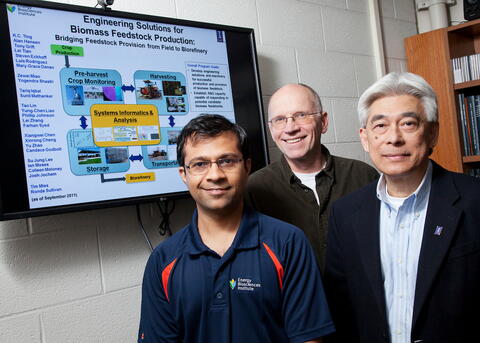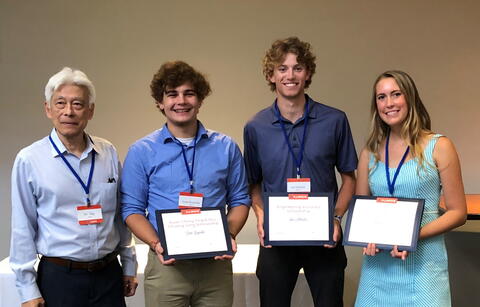A full circle journey: K.C. Ting honored with distinguished alumni award

Growing up in Taipei, K.C. Ting never anticipated that agricultural engineering would be his calling. “It took me by surprise,” he shared, recalling the entrance exam system in Taiwan that directed students to universities based on their rankings. Out of 100 options, his assignment to agricultural engineering wasn’t his top choice, yet it set the stage for a lifelong career that blended his love for engineering with agriculture.
After earning his bachelor’s degree from National Taiwan University, he fulfilled his military service before pursuing further education abroad, following the path of his professors there who likewise came to the U.S. to study.
His selection of the University of Kentucky was serendipitous — chosen by chance through a catalog he picked up at the American Information Office. With limited English but an abundance of determination, he embarked on what would become a lifelong journey in the U.S.
At Kentucky, he worked on optimizing grain drying, which provided him with a foundational understanding of agricultural systems and air-conditioning processes.
Next, he came to the University of Illinois Urbana-Champaign to pursue a doctorate in the Department of Agricultural and Biological Engineering, part of the College of Agricultural, Consumer and Environmental Sciences and The Grainger College of Engineering.

At Illinois, Ting explored the use of solar energy to provide an alternative energy source for drying crops. His work was particularly relevant during the energy crisis of the late 1970s when renewable energy solutions were gaining interest.
Following his doctoral studies, his professional journey took him to several institutions, each adding depth to his expertise and broadening his impact. He never would have imagined this journey would bring him back to Illinois.
As an assistant professor at the University of Houston, TIng explored applications in HVAC systems, and as a faculty member at Rutgers University, he began to dive into the emerging field of controlled environment agriculture by developing robotics solutions to automate greenhouse processes and optimize growing conditions.
At Rutgers, as an assistant professor, he embraced the role of department chair. Later, he was recruited to Ohio State University to serve as department chair before his alma mater approached him to lead the ABE department at Illinois after 24 years away.
“Every rank of faculty, every place I worked, I was chair. It’s interesting — I never grew out of my job,” he said with a smile. “The fun part is playing a role in advancing a department, college, and campus — but being a department head means you work for everyone. It’s just like coaching five different sports at the same time,” he remarked, underscoring the collaborative spirit and high demands of the role.

His ties to the department as an alum, combined with his technical expertise and leadership experience, made him a natural fit for the role.
Over the course of 12 years as department head, serving from 2004-2016, Ting dedicated himself to ensuring the department’s sustainability and competitiveness.
He also helped the college and the university expand their global reach, developing international collaborations and leading projects in almost every continent. He advanced pivotal initiatives that brought in landmark funding for the department, such as the BP-funded Energy Biosciences Institute, the ADM Institute for the Prevention of Postharvest Loss, and the USAID Appropriate Scale Mechanization.
“You cannot satisfy 100% of people 100% of the time,” he shared, “but if you see the changes you made, you realize you had some long-term impact.”
His achievements and service don’t stop there — he has also served with distinction in professional organizations like the American Society of Agricultural and Biological Engineers (ASABE), where he has chaired committees and helped advance work in circular bioeconomy systems.
Even in retirement, he continues to make his mark on the international stage. From 2017 to 2020, Ting served as the inaugural vice dean to help establish the Zhejiang University International Campus in China. The campus has over 26 buildings on 80-hectares of land, and three colleges, where all courses are taught in English.
What’s more, K.C. and his wife, Susan, have established an endowed scholarship in The Grainger College of Engineering that supports undergraduate students in the ABE department. As a testament to his impact, his former students took the initiative to rally alumni and friends to create another scholarship fund in the ABE Department in his honor. “I wasn’t very optimistic,” he admitted, drawing from his years of fundraising experience. “It’s not easy to raise funds, but they did it in several months.”
Today, Ting divides his time between mentoring students, giving lectures, and staying engaged in the ever-evolving fields of agricultural engineering. “It’s good to stay active,” he said, reflecting the modesty that has defined his approach to service leadership. For him, the reward has always been about advancing knowledge and creating opportunities for the next generation.
While the rewards of his career go beyond titles and accolades, this fall, his journey came full circle. The very department he once led honored Ting with the Distinguished Alumni Award, a recognition he helped create years ago.
"It is an overwhelming honor to receive this award, especially knowing the distinguished legacy it represents. I have always been dedicated to advancing our field and supporting the next generation, but I never expected to be recognized in this way. For me, this award is a reflection of the collaborative efforts and achievements of so many colleagues and students I’ve had the privilege to work with. I am grateful and humbled to be a part of this extraordinary community."
The ABE Distinguished Alumni Award was established in 2008 and the Young Alumni Achievement Award was introduced in 2020 to recognize alumni who have achieved significant success and distinction in their careers. Awardees are selected for their contributions to their professions and the lasting impact they have made in their fields. Nominations are accepted through an online submission form.